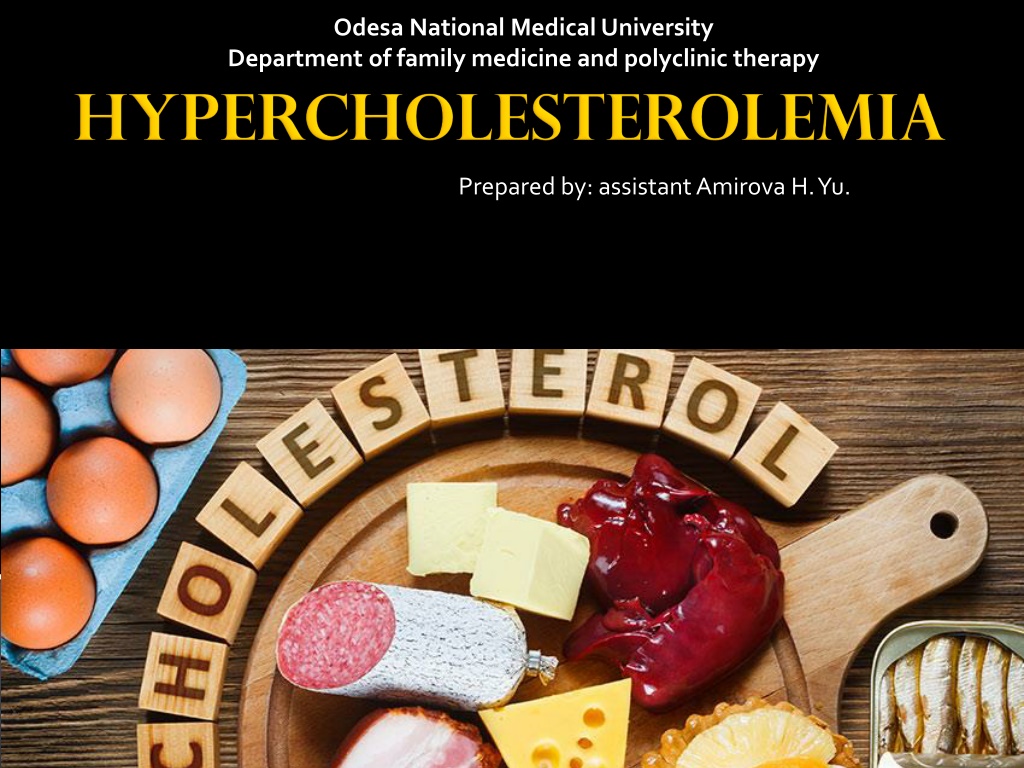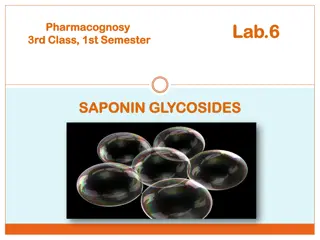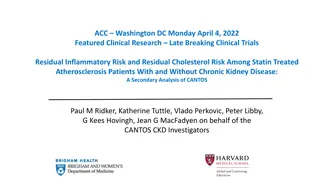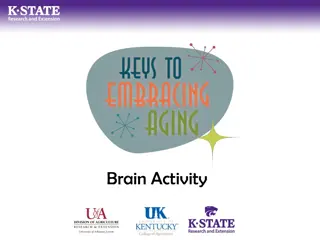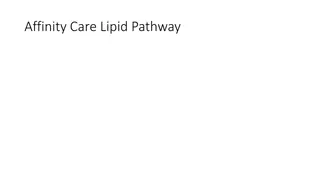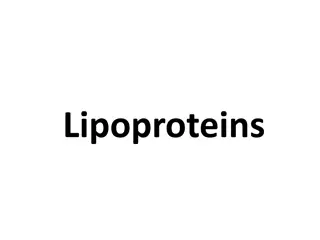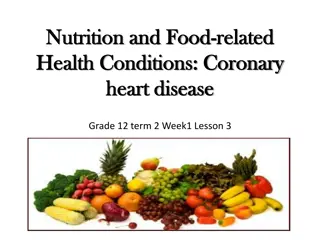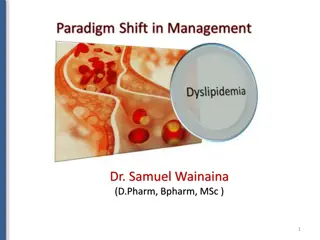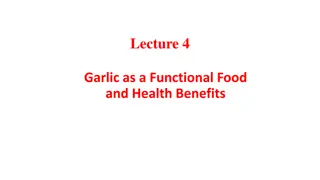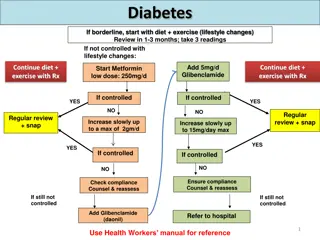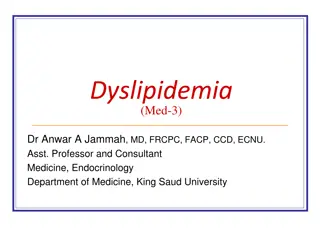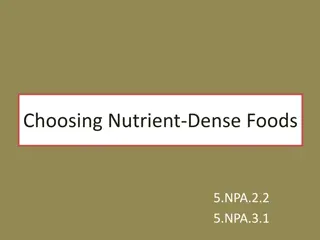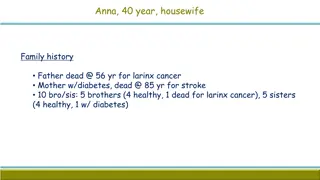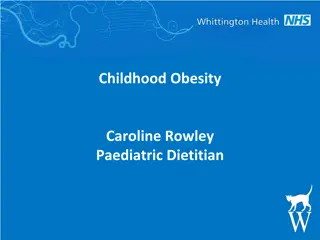Understanding Cholesterol and Its Impact on Health
Cholesterol is essential for bodily functions but too much of it can lead to health issues. LDL cholesterol is known as "bad" cholesterol, while HDL cholesterol is considered "good". High cholesterol levels can increase the risk of heart disease and stroke. Managing cholesterol through diet, weight control, exercise, and medication is crucial for overall health.
Download Presentation

Please find below an Image/Link to download the presentation.
The content on the website is provided AS IS for your information and personal use only. It may not be sold, licensed, or shared on other websites without obtaining consent from the author. Download presentation by click this link. If you encounter any issues during the download, it is possible that the publisher has removed the file from their server.
E N D
Presentation Transcript
Odesa National Medical University Department of family medicine and polyclinic therapy Prepared by: assistantAmirova H. Yu.
Cholesterol is a waxy, fat-like substance made in the liver and other cells. It s also found in certain foods, such as dairy products, eggs, and meat. Our body needs some cholesterol to function properly. Its cell walls, membranes need cholesterol to produce hormones, vitamin D, and the bile acids that help to digest fat. But the body only needs a limited amount of cholesterol.
Low density lipoproteins (LDL) are also called "bad" cholesterol because it can cause plaque buildup on the walls of arteries. High density lipoproteins (HDL) are also called "good" cholesterol. If your HDL level is low your risk of heart disease goes up. Very low density lipoproteins LDL) are similar to LDL in that it contains mostly fat and not much protein. Triglycerides, another type of fat, are carried in the blood by VLDL. Excess calories, alcohol, or sugar in your body are converted into triglycerides and stored in fat cells throughout your body.
DIET: Saturated fat and cholesterol in the food you eat increase cholesterol levels. To lower your cholesterol level, try to reduce the saturated fat and cholesterol in your diet. WEIGHT: In addition to being a risk factor for heart disease, being overweight can also increase cholesterol. Losing weight can help lower your LDL and total cholesterol. And it can also increase the level of HDL. EXERCISE: Regular exercise can lower LDL and raise HDL.
AGE AND GENDER: As you get older, cholesterol levels rise. Before menopause, women tend to have lower total cholesterol levels than men. After menopause, though, women's LDL levels tend to rise. DIABETES: Poorly controlled diabetes increases cholesterol levels. Having control of your diabetes can cause your cholesterol levels to fall. HEREDITY: Your genes partly determine how much cholesterol your body makes. High blood cholesterol can run in families. OTHER FACTORS: Certain medications and medical conditions can cause high cholesterol.
High cholesterol, also known as hypercholesterolemia, is a major risk factor for heart disease and stroke. Abnormal levels of LDL cholesterol or HDL cholesterol are treated with a low-fat diet, exercise, and medications such as statins.
High cholesterol is associated with an elevated risk of cardiovascular disease. That can include coronary heart disease, stroke, and peripheral vascular disease. High cholesterol has also been linked to diabetes and high blood pressure
The main risk from high cholesterol is coronary heart disease if the cholesterol level is too high, Cholesterol can build up in the walls of your arteries. Over time, this buildup called plaque causes hardening of the arteries or atherosclerosis. This causes arteries to become narrowed, which slows the blood flow to the heart muscle. Reduced blood flow can result in angina (chest pain) or in a heart attack if a blood vessel gets blocked completely
To assess your cholesterol level, the doctor will usually ask for a simple blood test called a lipoprotein profile. The lipoprotein profile evaluates the following: HDL LDL Total cholesterol level Triglycerides
Doctors emphasize diet, exercise, and weight loss to reduce cholesterol. Medications are another important option to lower heart disease risk. If you have high blood pressure, high cholesterol, or a history of heart problems, you have a higher risk of heart attack and stroke. You can lower your risk by making this small change: At each meal, choose foods that are good for your heart. Most diets are based on foods you shouldn t eat.
Eat more beans, legumes (like lentils), seeds, and nuts. Weekly target: 4 servings of either nuts, seeds, or legumes such as black beans, garbanzos (also called chickpeas), or lentils. Eat more vegetables, fruits, and whole grains. The fiber in these foods helps lower LDL cholesterol. At least 5 cups of fruits and vegetables and three 1-ounce servings of whole grains a day. Feed your body regularly. When you skip a meal, you re more likely to overeat later. For some people, eating 5 to 6 mini-meals works best to limit calories, help control blood sugars, and regulate metabolism. For others, 3 meals a day works better, since extra meals can trigger overeating. See which approach works for you.
NUTS OMEGA -3 FATTY ACIDS FATTY FISH : SALMON,TUNA,MACKEREL OATMEAL AND OAT BRAN
Hypercholesterolemia medications go in many types: Statins (HMG CoA Reductase Inhibitors) Fibrates Niacin Cholesterol absorption inhibitors Bile acid sequestrants Omega-3 fatty acids
CLINICAL USES : Hypercholesterolemia Familial Hypercholesterolemia Coronary atherosclerosis Prophylaxis for coronary atherosclerosis. ADVERSE EFFECTS AND CONTRAINDICATIONS: HMG-CoA inhibitors are contraindicated in pregnancy. Liver disfunction
SIDE EFFECTS: headache dizziness feeling sick feeling unusually tired or physically weak digestive system problems, such asconstipation,diarrhoea,indigestion muscle pain sleep problems low blood platelet count
Choice of agentWhen choosing fibrate therapy, we generally preferfenofibrate togemfibrozil since it has fewer drug interactions, is generally better tolerated, and patient compliance is better due to its once-daily dose. The side effects of fibrates include nausea, stomach upset, and sometimesdiarrhea Fibrates can irritate (inflame) the liver. The liver irritation usually is mild and reversible, but it occasionally can be severe enough to require stopping the drug.
